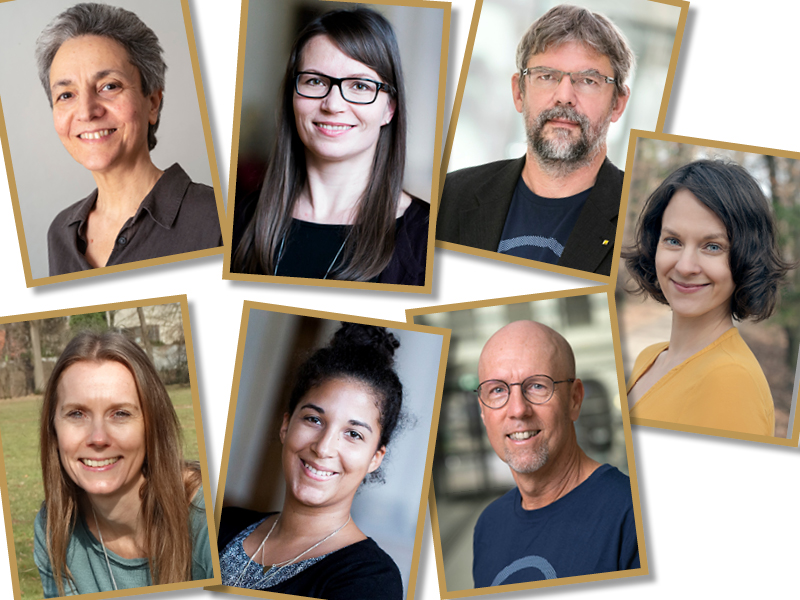Following a challenging 2020, Arqus – the European University Alliance, comprising the University of Graz and six partners – has some ambitious plans for 2021. Over the next few weeks, the people at the University of Graz who are involved in the Arqus alliance will be reporting on what it has achieved so far and what objectives it has set itself for this year.
Today: the Local Management Team at the University of Graz, consisting of Diana Afrashteh and Alexandra Dorfer (steering committee ); Anja Hoffmann (project coordination ) and Victoria Reszler (project assistance); Andreas Raggautz (quality assurance committee) and Gerhild Leljak (communication).
The alliance aims to increase and intensify collaboration in the areas of research, teaching, administration and societal engagement, enhancing the excellence and appeal of European higher education, as well as producing graduates equipped to meet the challenges of the coming decades. To achieve these goals we need engagement, expertise, coordination, communication and quality management at each of the Arqus universities. The local management team plays an important role. Today we are talking to the people at management level in Graz with responsibility for Arqus.
Diana Afrashteh and Alexandra Dorfer, steering committee:
First of all we want to give a big round of applause and pay thanks to the highly-committed team in Graz: despite the current situation and the challenges created by COVID-19, they managed to adapt the formats of numerous activities with only minimal changes from the original work programme and schedule. Finding common ground, accepting compromises and reaching agreement on a shared interpretation of the themes takes a lot of time, requires great patience and people willing to let go of some of their own ideas. Although this is sometimes difficult, it generally results in more productive outcomes for all. Within the alliance, we have intensified discussions with the first 17 approved alliances in the informal network FOR-EU, exploring some pan-European themes together – such as the concept of a “European degree” – and working towards the idea of an inter-university campus. Arqus will also be firmly embedded in the 2022-2027 development plan and the new internationalisation strategy for 2021-2025. Another goal is to broaden the involvement of students and staff at the University of Graz, and to establish Arqus as a strategic undertaking, both within and beyond the university.
Anja Hoffmann and Victoria Reszler, project coordination and project assistance:
Developing a vision, putting it into action and working with it as a reality makes for an appealing challenge, and also an exacting one. At the University of Graz our objective was to establish the innovative idea of a European university alliance. In spring 2020, we were given the responsibility of coordinating the application for top-up-funding under the EU research and innovation programme, “Horizon 2020”. Orchestrating opinions and ideas from seven partner universities in order to compile a successful application within the very tight time frame set by the EU, in parallel with COVID-19, was one of the greatest challenges of the last year. On 1 January 2021, we began work on the H2020 project “Arqus R.I.”, within which the University of Graz is responsible for academic coordination, the leadership of the “Joint Science & Innovation” challenge, and the work package of the “Roadmap towards transformation(al) excellence”.
We are currently working with the Université de Lyon on a draft concept for an “Arqus PhD Week for Careers outside Academia”, with the aim of encouraging entrepreneurship and creativity throughout the entire university community, involving regional resources and the complementary strengths of all the partner universities. In addition, research focus forums will bring together academics at the University of Graz and researchers from the Arqus partner universities, in order to initiate and intensify collaboration in selected fields of excellence.
Andreas Raggautz, Quality Assurance Committee (QAC):
The Quality Assurance Committee is responsible for coordinating all supervision and evaluation activities, monitoring implementation of the programme of work from the perspective of quality assurance. A quality management (QM) handbook has been compiled to serve as the basic toolkit for this purpose. In doing this, however, we must not underestimate the complexity of the work packages, and particularly any cumulative effect of the way they dovetail together, as well as in the context of the H2020 project “Arqus R.I.”. Since the pandemic is also likely to be ongoing, it will be important to remain flexible while also meeting the targets set by the EU, as well as fitting in the numerous surveys in the plan. So this year we plan to conduct the first interim monitoring process so that we can identify any structural weaknesses at an early stage.
Gerhild Leljak, communication:
We only know about things if people talk about them, so the job of the communication team is to ensure that the Arqus is a regular topic of conversation at the University of Graz. In consultation with our colleagues in Bergen, Granada, Leipzig, Lyon, Padua and Vilnius, we have developed two formats to regularly showcase the impressive combined expertise within the Alliance, thanks to its researchers: the Arqus Academic Debates – live discussions by academics on the Arqus YouTube channel – as well as the “Knowledge Pills” podcast, where each episode explores a specific topic in about 15 minutes of conversation with an expert. In the second year of Arqus, my colleague Andreas Schweiger and I aim to focus more on the people for whom Arqus is intended: outgoing and incoming participants – i.e. the students, researchers and administration staff – who, thanks to the Alliance, have an opportunity to study, research or work at seven excellent European universities. Full details of calls for applications and events are always published well in advance in the Arqus Newsletter.
>> More about Arqus
>> Retrospective: Faces of Arqus#1: the Local Management Team (2019)
